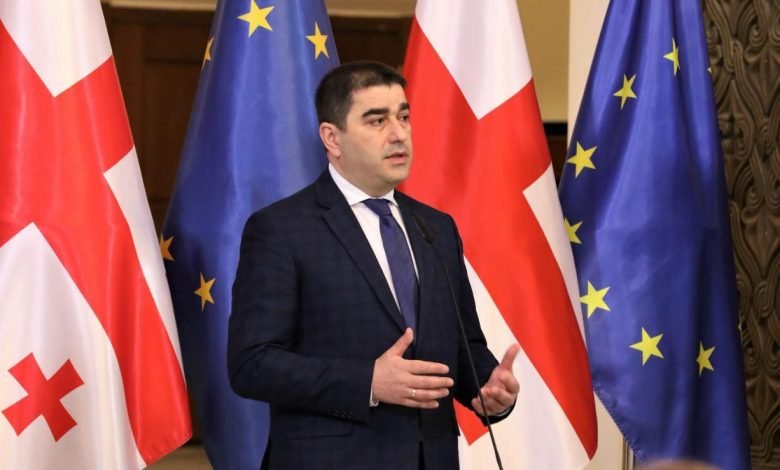
Parliament Speaker Talks ISFED, CEC Chairperson Candidates
Shalva Papuashvili, Speaker of the Georgian Parliament, led a briefing on 21 August and discussed the ruling Georgian Dream party’s arguments for not inviting the International Society for Fair Elections and Democracy (ISFED) to the first meeting of the electoral reforms working group. He also criticized President Salome Zurabishvili for not presenting the acting chairperson of the Central Election Commission (CEC), Giorgi Kalandarishvili, as a candidate to officially assume the post.
ISFED’s Exclusion
Speaker Papuashvili justified not inviting ISFED to the working group with the argument that the organization crossed “the boundary between [being] a non-governmental organization and a political party.”
More specifically, according to MP Papuashvili, ISFED is one of the organizations which urged Parliament to dismiss the government and issued a one-week ultimatum for a technical interim government to take its place during a protest the day after the European Council decided not to grant Georgia EU candidate status on 24 June.
“They could not follow this ultimatum to its end, due to the fact that the people turned their backs on this radical demand, although this demand is still hanging in the air and they have not removed it,” Speaker Papuashvili said and added that when ISFED expressed willingness to participate in the working group the ruling party asked them if they still supported the ultimatum.
“Unfortunately… they refused to condemn the demand. Therefore, they were not invited to the working group,” MP Papuashvili emphasized, adding that, “if they no longer share this position and remove this demand, of course, they can fully participate in the working groups. Otherwise, cooperation in terms of working groups will be impossible.”
In response to the decision of several CSOs to exit the working process in support of ISFED, Speaker Papuashvili underscored that this is an expression of “unhealthy solidarity” towards their colleagues.
“The line between solidarity and corporatism is very narrow and, unfortunately, at this time, the line has been crossed and instead of healthy solidarity, we see pure corporatism,” the Speaker stressed.
MP Papuashvili highlighted the 2020 elections during which certain flaws were founded in the parallel counting of the votes by ISFED and stated that such CSOs showed the same corporatism and “false solidarity” even then.
“We also appealed to non-governmental organizations at the time to help us see the results of the parallel count, including for them to speak with ISFED and all the elite organizations distanced themselves from this subject. They said that their profile does not include parallel vote counting and they did not want to criticize their colleague organization,” he added.
Asked by a journalist whether the ruling party’s decision is related to political retribution for the 2020 elections, the Speaker explained that ISFED had been invited to participate in an electoral reforms working group after the 2020 elections controversy, hence, “what retribution are we talking about [now]?”
According to MP Papuashvili, it is necessary to “timely evaluate” the ultimatums and “radical agenda” that several CSOs have, “because if we do not have our position on this, it will only encourage the radical agenda, which means encouraging polarization.” “Especially in light of the fact that several radical parties are announcing that they are planning radical protests in the fall,” he added.
Asked by journalists whether he had communicated with Georgia’s partners since the exclusion of ISFED from the working group, the Speaker explained that they are aware of the working process.
- U.S. Embassy: ISFED’s Exclusion Contradicts European Commission’s Recommendations
- EU Delegation Urges CSO Inclusion in EU Reforms Process
MP Papuashvili also addressed criticism that CSOs are not involved in the working process and stated that two CSOs are represented in every working group, “which, in turn, represent about 200 non-governmental organizations.”
“We cooperate with the Eastern Partnership Civil Society Forum, in which almost all-non governmental organizations are united. We have agreed with them that in order to have a working environment in the working groups, they will nominate 2 organizations [for each group], which in turn will be a bridge between the working group and about 200 non-governmental organizations,” he explained.
MP Papuashvili added that there is also the possibility of rotating the CSOs in the working groups, “therefore, not only broad involvement is ensured, but almost 200 organizations are directly or indirectly involved.”
President’s CEC Chairpersonship Nomination
Regarding President Zurabishvili’s nomination of candidates for the chairpersonship of the CEC, Speaker Papuashvili emphasized that it is “regrettable” that she did not “objectively” justify why she did not select Kalandarishvili and any issues she may have had with his competence. “In my opinion, this is the encouragement of the opposition’s radical agenda,” he said.
According to MP Papuashvili, the requirement of a qualified majority for the election of the CEC Chairperson for a 5-year term, “encourages the radical agenda of the opposition.”
He also noted that the President’s decision “in general discredits qualified, honest, and professional civil servants.” “Therefore, I am very sorry that a qualified candidate [referring to Giorgi Kalandarishvili] was not presented.”
This post is also available in: ქართული Русский